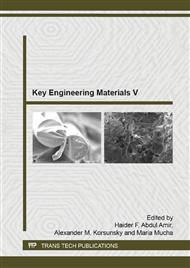p.495
p.500
p.505
p.510
p.514
p.519
p.525
p.529
p.533
Effect of Different Operating Temperatures on Mechanical Properties of Several Rolled Aluminum Alloys
Abstract:
The five kinds of 1100, 1050, 1108, 8079 and 8079H alloy sheets have been prepared by melting, casting and rolling process and tensile strength and elongation of alloys have been tested at room temperature, 100°C, 200°C, 300 °C. For provide a reference of the mechanical properties for the applications of these alloys. It was indicated that the mechanical properties of alloys were significantly different at different operating temperatures, the overall trend is that the tensile strength (σb) of the alloys decreased significantly and the breaking elongation (εb) of the alloys remarkably increased with the increase of the testing temperatures. The tensile strength of the alloys are about 30MPa at 300°C, so the operating temperature of the alloys should be controlled below 300°C.
Info:
Periodical:
Pages:
514-518
DOI:
Citation:
Online since:
July 2015
Authors:
Keywords:
Price:
Сopyright:
© 2015 Trans Tech Publications Ltd. All Rights Reserved
Share:
Citation:


